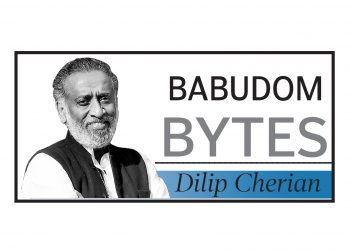The voter data theft case in Karnataka (reported in this column on December 29, 2022) has come alive again, just when the state is about to go to polls. A probe by the Election Commission, conducted by IAS officer Amlan Aditya Biswas, Regional Commissioner, Bengaluru Division, has found that many officials of the Bruhat Bengaluru Mahanagara Palike (BBMP) gave illegal and undue favours to a private trust called Chilume, allowed it to collect voter data, and even tried to subvert a complaint against the trust.
While the probe has established the links between BBMP officials and the trust, it is yet to establish where the data collected by Chilume Trust is kept. The report states it could be stored on foreign servers, possibly Chinese or Eastern European, in violation of ECI’s rules.
In December 2022, DKB reported that the Bommai government had reinstated two IAS officers K Srinivas and S Rangappa, less than a month after they were suspended in the voter data theft case, defying an Election Commission order. The new report puts it in a spot.
The report will further damage the embattled Basavaraj Bommai government, which is already on the back foot following allegations of large-scale corruption, barely weeks before the state goes to polls. It will give further ammo to the Opposition parties who have been calling for stern action against officials and other employees since the scam emerged.
Jharkhand babu’s innovations
There are reasons why the Department of Commercial Taxes in Jharkhand makes a good case study for those in other states seeking to increase revenue collection. Jharkhand has recently achieved a record in revenue collection of nearly Rs 21,000 crores, primarily due to the establishment of an Intelligence and Revenue Analysis Unit (IRAU) and Special Task Unit (STU), under Aradhana Patnaik, Principal Secretary, Commercial Tax, and her committed team of number crunchers.
Over the past two years, sources have informed DKB, the department has taken several measures, including the creation of IRAU, for revenue augmentation. IRAU has been set up in the department headquarters where Patnaik leads a team of officers who are adept in computer knowledge and tech-savvy with domain knowledge in GST Tax laws and data analytics. While IRAU is responsible for sector-wise analysis and gathering information for enforcement action. STU focuses on big taxpayers with turnover of more than Rs 10 crore, which contribute to 95% of the total tax revenue of the department.
The Department has followed a targeted approach to maximising return compliances and revenue collection, leading to 100% return filings by taxpayers with an annual turnover of over Rs 5 crores. Besides, Patnaik has created a dedicated GST audit wing, a targeted enforcement mechanism, and an online VAT assessment module. These initiatives have led to spectacular performance in terms of revenue collection and growth.
Most agree that augmenting revenue resources in a state like Jharkhand is not easy. But here’s the best part – the approach adopted by Patnaik and her team is replicable and scalable. The Centre has noticed, and hopefully, other states too are taking note.
Questionable move in Chhattisgarh
The trend of re-engaging officers for important government assignments, begun by the Centre, is now happily followed by state governments as well. Many see this practice to maintain a strong grip on administration and promote political interests.
The Chhattisgarh government of Chief Minister Bhupesh Baghel has appointed retired IPS officer DM Awasthi as the Officer on Special Duty (OSD) at the Raipur police headquarters. Awasthi will reportedly oversee the Economic Offences Wing and Anti-Corruption Bureau. What raised eyebrows in babu circles was that even though Awasthi retired on March 31, he was immediately hired as the OSD on a contractual basis.
While this may point to the senior cop’s closeness to Baghel, there are some others who are raising concerns associated with this practice. The government may argue that re-hiring Awasthi was necessary to ensure efficiency and productivity in the administration, there are a few who believe that it undermines the principles of fair competition and equal opportunity for all officers, regardless of their age or seniority. They are also questioning the move claiming that it also sends a wrong message to younger officers who may feel demotivated by the lack of upward mobility opportunities.
Perhaps, for Baghel, having his trusted babus around him is far more assuring as he enters the last leg of his Congress government’s term and aims to return to power in the state.
Share a babu experience! Follow dilipthecherian@twitter.com. Let’s multiply the effect






































